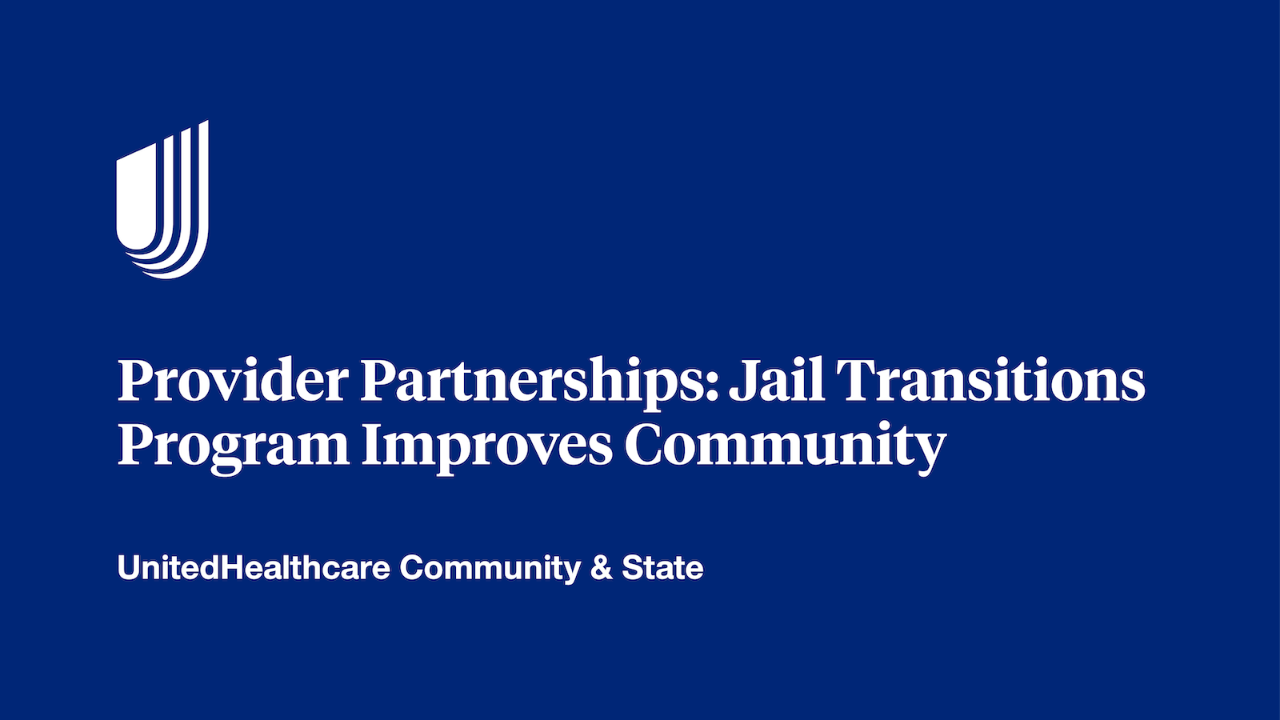Social drivers of health (SDOH) such as socioeconomic status, education, physical environment, employment and access to health care all have drastic impacts on individual health and quality of life. And addressing negative SDOH impacts is heavily dependent on the joint efforts of health care providers, community-based organizations and local agencies — including the justice system.
The UnitedHealthcare Community & State (UnitedHealthcare) Jail Transitions Program in Washington State partners with the Department of Corrections to provide care coordination for our incarcerated members. These individuals, who are on suspended status, often have complex needs and limited experience using health benefits. Through strategic transition plans, members can connect with health and community services and better understand how to utilize their Medicaid coverage following release.
The Jail Transitions Program currently serves members incarcerated at the South Correctional Entity (SCORE) jail in Des Moines, Washington, which intakes approximately 26,000 inmates every year. This facility was chosen due to the complex needs of its population. On average, 8 in 10 of the jail's incarcerated population are detoxing — largely from opiates — and 60% face complex social challenges associated with mental health disorders.
Connecting members with relevant health and community services
Every week, SCORE jail provides UnitedHealthcare a list of member referrals. From this list, UnitedHealthcare care coordinators review each member’s medical and pharmacy claims to gain insight into their individual needs. Incarcerated members who are eligible for the program include those who are set to be released within 30 days and have:
- Comorbid medical conditions
- Substance use disorder history
- Mental health conditions
- A Promoting Risk Intervention by Situational Management (PRISM) score greater than 1.0 (evaluating situational risk factors known to influence institutional violence)
- Prior history of mental health or substance use disorder treatment
After eligible members are identified, they are given the choice to meet with a care coordinator to develop a transition plan in preparation for their release. This plan is developed based on the member’s response to an established questionnaire that covers:
- Medical needs
- Behavioral health needs
- Housing status
- Plans after release
- Community Corrections Officer (CCO) contact information
- Goals to support living a healthier life
- Goals to support staying out of jail
Depending on member needs, care coordinators may arrange or provide information for the member to see a primary care provider, behavioral health practitioner or enroll in chemical dependency services. Coordinators may also determine that a registered nurse referral is necessary post-release to address cancer (active treatment), high-risk pregnancy, advanced liver disease, pre-dialysis and dialysis level kidney diagnosis or HIV/AIDs. They may also refer the member to a community health worker post-release for assistance with housing, transportation or other community resources.
Providing training to help members advocate for themselves
Many incarcerated individuals in the program are not familiar with using their health insurance. To help members seek care and advocate for themselves upon release, the program offers in-person Medicaid 101 training on a biweekly basis. This helps teach individuals what benefits they are eligible for, how to identify a care provider, what to expect at an appointment, how to access contraceptives and other health-minded topics. Because many of our members in the program do not have definitive plans after release, coordinators also discuss how to seek services that can assist them as they transition back into their communities.
Connecting with members during and after transition
Every member in the program receives a follow-up call after their release to ensure that the needs identified in their transition plan have been met, or that they are continuing to coordinate services to address them. For members requiring support, coordination services are provided by a registered nurse or community health worker for a minimum of six months after release, depending on need.
Since transitioning out of jail through the program, several members in the program have admitted themselves into treatment, have recovered and are now employed. Several others have enrolled in college. By focusing on each member’s need and helping them overcome roadblocks to recovery, the program helps members transition out of incarceration and live healthier lives.
We are currently exploring working with jail facilities in other counties to expand our ongoing partnership with the Department of Corrections. As we continue to develop the program and our creative strategies, we will be able to assist more of our incarcerated members as they transition into a healthier, more independent life.
